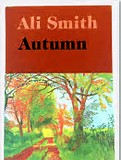

It has been Man Booker announcement week. After the last couple of years of reading the shortlist, beginning as soon as the long-listed titles were chosen so I got some chance of fitting them in time before the winner’s announcement, I decided this year not to read any of them.
There were a number of reasons for this. Firstly, last year’s winner “Lincoln In The Bardo” by George Saunders proved what a lottery the whole thing is (Julian Barnes has referred to the award as “Posh Bingo”). Secondly, despite reading a good chunk of eligible literary fiction during the year I hadn’t even read one title on the longlist and when the shortlist was announced I wasn’t motivated enough by the choices to put this right. I did think that after the last couple of last summer/autumns getting through the titles that it was going to become a bit of an obsessive feature in my reading year, but I haven’t missed it in the slightest this year.
That is in many ways a shame because it this Literary Prize’s 50th Anniversary and I don’t know whether the first writer from Northern Ireland to win the award, Anna Burns for “Milkman” was the most deserving winner. (I’d read one previous novel by Richard Powers but not his latest, all the rest of the authors were new to me). I didn’t even watch the announcement on TV.
I did, however, tune in to this BBC4 documentary which was shown to mark the Booker’s 50th and which concentrated more upon the Prize night and the intrigue and controversy which has dogged or (more probably) enriched its history. Apparently, “the Booker has always been a magnet for scandal “ and this hour long documentary was prepared to spill the beans.
It was a mildly diverting hour which saw such anecdotes as John Banville recalling how one short-listed year he had got so drunk that had he won the award he wouldn’t have been able to collect it (he didn’t win), Anne Enright not being able to visit the loo, judges falling out over their choices and Selina Scott floundering on a live TV presentation by not recognising the judges. More shocking than all of this was the amount of cigarette smoke wafting in the air in clips from award ceremonies of just a few years back and also the number of times we saw the same bits of footage (Yann Martel jumping to his feet in triumph on quite a few occasions, for example).
Despite it being one of the literary world’s most prestigious prizes it can be a bit of a rod for the winners’ backs. 2103 winner Eleanor Catton, the youngest recipient, confided it has taken her years to get back on track and Dotti Irving, PR for the prize, said; “Quite often writers are in the middle of their next book. They want peace and quiet for that, well, they’re not going to get peace and quiet in the wake of the Man Booker.”
Nevertheless, this is the one that everyone, whether they admit it or not, wants to win. Kingsley Amis famously claimed he didn’t until he did, then it was a different story. Some of the older clips illustrated how media-savvy the modern writer has to be compared to the intellectual ramblings of literary titans of the 70’s and 80’s a time when everything seemed very beige.
I really want the Man Booker to feel more relevant. You can find the odd gem on the shortlist but they do need to ensure that they are getting the balance between quality and readability right and I do think that the Costas, for one, are currently doing this better. However, I certainly would not turn down the opportunity to be a Man Booker judge. This year there was a different feel to the longlist with both a graphic novel and more commercial crime fiction (Belinda Bauer’s “Snap”), which could have shaken things up had it appeared on the shortlist. With Val McDermid on the judging panel I had high hopes but it was not to be.
 2018 judges with the shortlisted titles
2018 judges with the shortlisted titles
Judging from the title BBC4 gave this there was an emphasis on the in-fighting in an attempt to make it all seem a little more sexy and watchable than it turned out to be. It did get me looking up how many Booker winners I have read from the last 50 years and I make it 15, which is probably more than the average reader. Will this year’s winner bring my total up to 16…..? You’ll have to watch this space…..

Barneys, Books And Bust-Ups was shown at 9pm on BBC4 on Monday 15th October. It is currently available to view on the BBC I-Player.











 I’m feeling a little discombobulated. Firstly, congratulations are due to highly esteemed American author Saunders who comes onto the shortlist much praised for his previous published works which includes essays, short stories and novellas. This is his first full-length novel and its arrival was much anticipated.
I’m feeling a little discombobulated. Firstly, congratulations are due to highly esteemed American author Saunders who comes onto the shortlist much praised for his previous published works which includes essays, short stories and novellas. This is his first full-length novel and its arrival was much anticipated.












